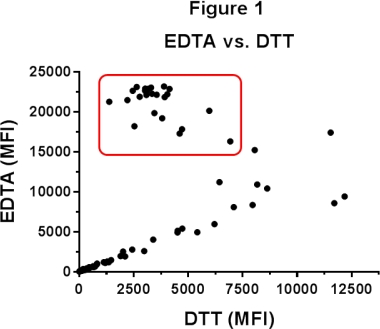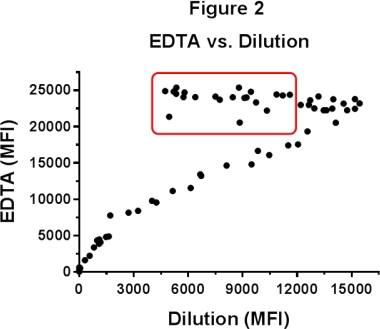Comparison of EDTA, DTT and Dilutions to Abrogate the Prozone Effect in Luminex-Based HLA Antibody Assays.
Department of Laboratory Medicine and Pathology, Mayo Clinic, Phoenix, AZ.
Meeting: 2016 American Transplant Congress
Abstract number: C18
Keywords: HLA antibodies, Panel reactive antibodies
Session Information
Session Name: Poster Session C: Antibody Mediated Rejection: Session #1
Session Type: Poster Session
Date: Monday, June 13, 2016
Session Time: 6:00pm-7:00pm
 Presentation Time: 6:00pm-7:00pm
Presentation Time: 6:00pm-7:00pm
Location: Halls C&D
Mean fluorescence intensity (MFI) values obtained from Luminex-based single antigen bead (SAB) assays is a semi-quantitative result used to determine the relative strength of HLA antibodies. MFI values can be used to predict the outcome and strength of the flow cytometry crossmatch. However, MFI values can be inaccurate, especially when inhibitory factors are present in the patient serum. In many cases, inhibitory factors can be removed by performing dilutions. Then, the real HLA antibody profile can be detected, this effect is called prozone. However, in dilution experiments the non-prozone antibodies are also diluted resulting in lower than expected MFI values.
The aim of this study was to determine the most effective and reliable way to overcome the prozone effect. Toward this, we compared the MFI values from parallel SAB analyses of undiluted (1:1), diluted (1:8), ethylenediaminetetraacetic acid (EDTA)-treated, and dithiothreitol (DTT)-treated sera (n=42) to explore which of these serum pre-treatments would be most effective in abrogating the prozone effect. As expected, the diluted samples exhibited significant increases in several MFI values compared to the undiluted counterparts. However, in particular samples, EDTA-treatment showed significantly better resolution of the prozone effect as compared to DTT-treatment (Figure 1) or dilutions (Figure 2).
The results of this study indicate that EDTA-treatment is significantly more effective in abrogating the prozone effect than DTT-treatment and dilutions. The reagent stability and cost-effectiveness of the EDTA treatment procedure provide additional advantages over DTT-treatment and dilutions for routine testing in the histocompatibility laboratory.


CITATION INFORMATION: Pando M, Franklin S, Nelson L, Desmarteau Y, Jaramillo A. Comparison of EDTA, DTT and Dilutions to Abrogate the Prozone Effect in Luminex-Based HLA Antibody Assays. Am J Transplant. 2016;16 (suppl 3).
To cite this abstract in AMA style:
Pando M, Franklin S, Nelson L, Desmarteau Y, Jaramillo A. Comparison of EDTA, DTT and Dilutions to Abrogate the Prozone Effect in Luminex-Based HLA Antibody Assays. [abstract]. Am J Transplant. 2016; 16 (suppl 3). https://atcmeetingabstracts.com/abstract/comparison-of-edta-dtt-and-dilutions-to-abrogate-the-prozone-effect-in-luminex-based-hla-antibody-assays/. Accessed March 2, 2026.« Back to 2016 American Transplant Congress
